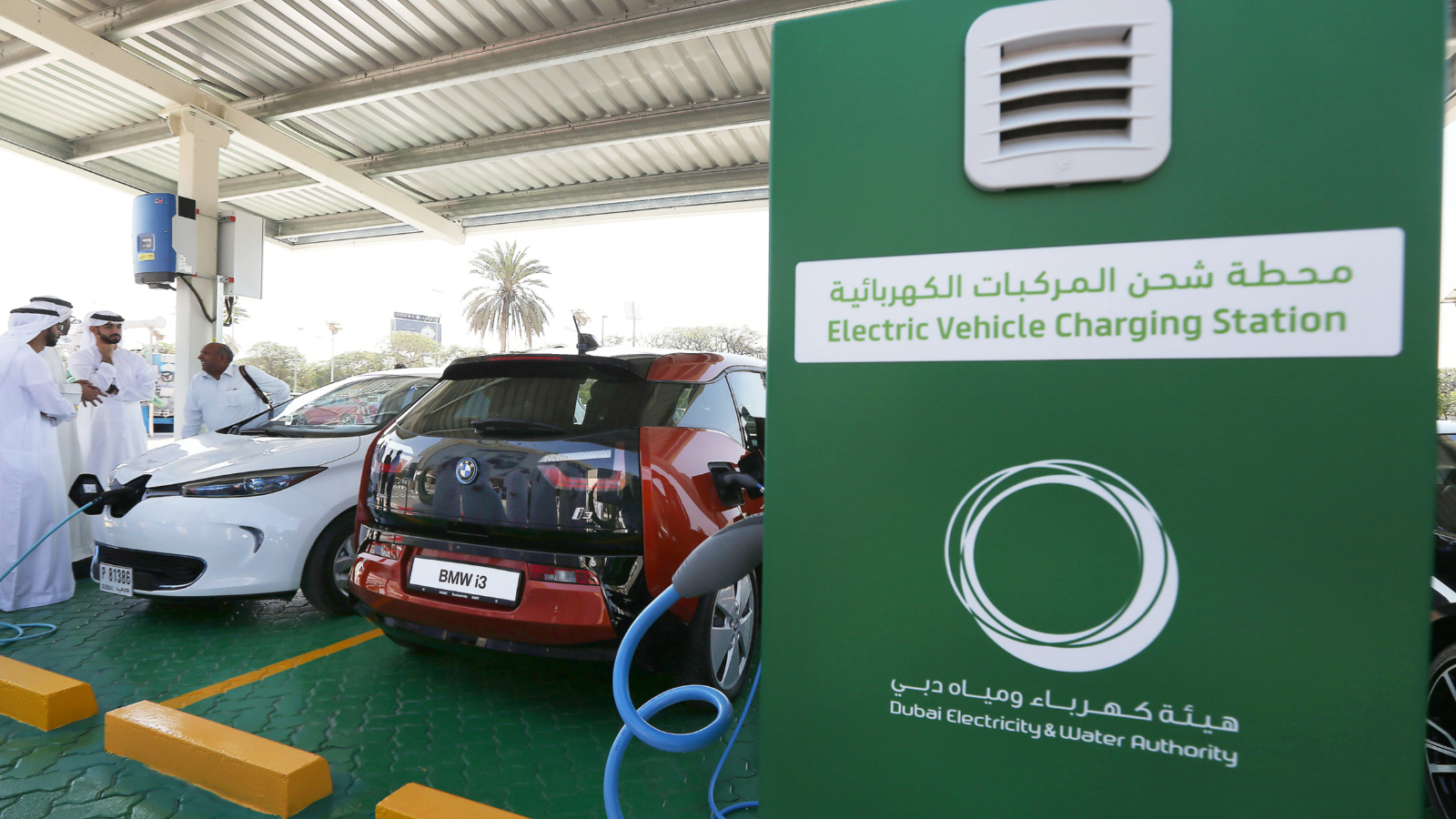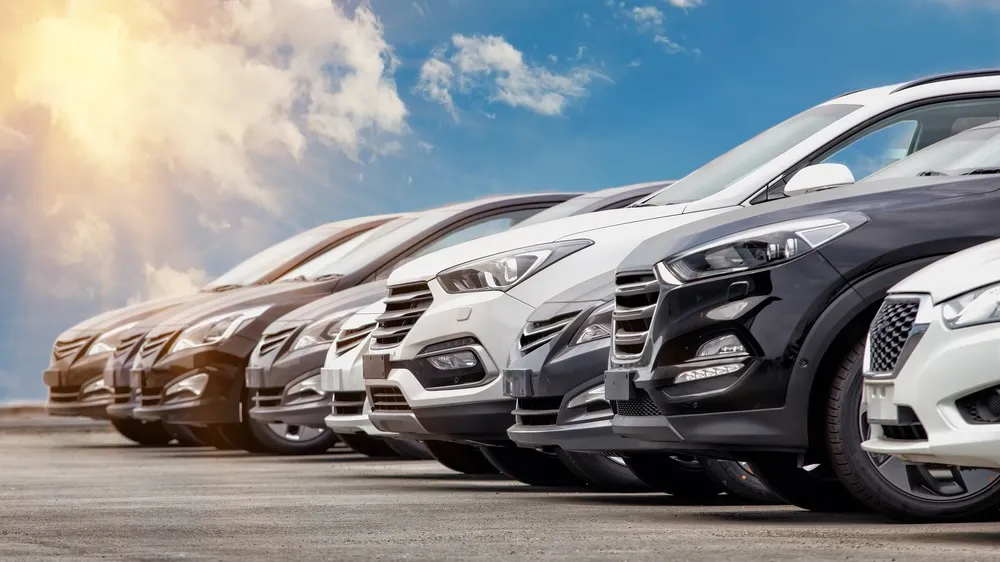Ultimate Guide To EV Charging Stations In The UAE: Charges, Locations & More

The United Arab Emirates (UAE) is at the forefront of a sustainable transportation revolution, actively promoting the adoption of electric vehicles (EVs). This comprehensive guide serves as a valuable resource for those seeking to navigate the landscape of EV charging stations within the UAE.
It also includes a detailed exploration of the various charging station types available, ranging from AC chargers ideal for routine charging to high-powered DC fast chargers suited for extended journeys. Read this linked article for tips on getting more range out of your electric car.
EV Charging Stations
Dubai’s EV charging network is the most comprehensive of all the Emirates. The Dubai Electricity & Water Authority (DEWA) has initiated installing Green EV Chargers across the city.
Etihad Water & Electricity (EtihadWE) is also setting up chargers across Ajman, Umm Al Quwain, Ras Al Khaimah, Dibba, Dhaid, and Fujairah. Abu Dhabi National Energy Company (TAQA) has also installed public EV charging stations across the emirate.
As of 2025, the UAE has expanded its EV charging infrastructure significantly, with Dubai alone operating over 1,270 EV charging points, and additional stations across Abu Dhabi, Sharjah, and other Emirates.
Types Of EV Charging Plugs Available In The UAE
- Type 2 Socket: This is the most common plug type used in the UAE for AC charging. It’s also known as the Mennekes plug and can deliver up to 43 kW of power.
- Combo CCS: This plug is becoming increasingly popular as it can handle both AC and DC fast charging. It can deliver up to 150 kW of power for DC fast charging.
- ChadeMO: This is another common DC fast charging plug, but it’s not as widely used as Combo CCS in the UAE. It can deliver up to 50 kW of power.
Types Of Chargers & Charging Speeds In The UAE
| Charger Type | Current | Power | Socket Type |
| Wall-Box | AC | 22kW | Type 2 Socket |
| Public Charger | AC | 22kW | Type 2 Socket |
| Fast Charger | AC | 43kW | Type 2 Socket |
| Fast Charger | DC | 50kW | ChadeMO & Combo CCS |
| Ultrafast Charger | DC | 150kW | CCS2 (Combo CCS) |
How To Find Charging Stations In The UAE?
Electric vehicle owners can find the nearest charging stations in the UAE with the help of a few sites and mobile apps apart from the standard Google search.

DEWA:
If you’re located in Dubai, DEWA is a great resource as they manage a large network of charging stations. You can find their station locations on their website or mobile app.
Links to DEWA: Website, iOS Mobile App, Android Mobile App.
PlugShare:
This is a popular app that allows you to find charging stations all over the world, including the UAE. It also provides user reviews and real-time availability information for some stations.
Links to PlugShare: Website, iOS Mobile App, Android Mobile App
ElectroMaps:
Another helpful website and app for finding charging stations across the UAE, including details on plug types and charger speeds.
Links to ElectroMaps: Website, iOS Mobile App, Android Mobile App
Dubai EV Community Hub:
This website provides information on EV charging in Dubai, including station locations and how to use the charging network. It also collects data from all the charging stations in the UAE and displays them to the user.
Google Maps & Apple Maps:
Both navigation maps offer a comprehensive database of charging stations, including details on plug types, charger speeds, and real-time availability. Read this linked guide for essential tips to increase the battery life of an EV.
EV Charging At Home
Charging an EV at home requires the EV to be registered and the process varies depending on the Emirates.
- Dubai EV users need to register their electric vehicles on the DEWA website. They can also opt for the EV Green Charger card. The total registration fee adds up to AED 520.
- Abu Dhabi EV users need to register their EV chargers and vehicles on the Abu Dhabi Distribution Company (ADDC) website.
- Once registered, a flat monthly fee of AED 92 is applied to all EV charger owners until a meter is installed by the utility. After the installation of the meter, billing is based on actual consumption.
- A similar procedure is followed in other Emirates.
How To Use DEWA Green Chargers?
Registered User
If you are a registered user, you can follow below mentioned methods to start charging your EV at the charging station.
DEWA Smart App:
- Scan the QR code on the EV Green Charger station using the app
- Log in and select the EV account and follow the instruction
Smart Device Camera:
- Scan the QR code on the charger from your smartphone
- Log in and select the EV account and follow the instruction
EV Green Charger Card:
- Scan your EV Green Charger card on the card reader placed on the charging station and follow the instructions.
Here is a link to register with DEWA.

Guest User:
However, it is not always necessary to be a registered user to use DEWA EV Charging stations. If you are a guest user, then choose either the DEWA Smart App or your smartphone QR scanner and follow the below steps.
- Scan the QR code on the charging station
- Choose “Continue as a Guest” on the log-in page
- Fill out the form for the Guest Mode
- Verify and confirm the email address by the OTP sent
- Select the preferred charging package
- Proceed to payment through the selected payment methods
EV Charging Costs
Home Charging Costs
Abu Dhabi:
The government established a standardised charging structure across the Emirate. All EV charging stations, public and private, must be registered with either ADDC or AADC. A temporary flat fee of AED 92 per month applies to all EV charger owners until a sub-meter is installed. After meter installation, billing switches to a per-kWh consumption rate, typically around 30 fils per kWh.
Dubai:
In Dubai, the charges are different as compared to Abu Dhabi. There is no flat fee for home charging. However, effective September 30, 2024, the standardised consumption rate is AED 0.70/kWh + 5% VAT for AC charging, as per UAE Cabinet Decision No. 81 of 2024. This replaces the previous rate structure of AED 0.38/kWh + AED 0.06 surcharge.
Other Emirates:
Sharjah, Ajman, and other Emirates have a similar structure to Dubai for charging EVs at home.
Public Charging Costs
As for the public or fast charging network in the UAE, the charges vary depending on each location. Some of them are even completely free to use. This is to promote the adoption of EVs in the country. Charging costs vary depending on the provider but generally range from AED 0.50 to AED 1.00 per kWh.
DEWA Charger Costs:
DEWA has clearly stated the costs for charging an EV and it varies depending on the user. Registered user pays similar to home charging costs. While a guest user will have to choose between various packages. Here are the details:
| Charger Type | Packages | Fees in AED (Including VAT) |
| Wallbox/Public Charger | 30 minutes | 5.08 |
| Wallbox/Public Charger | 60 minutes | 10.16 |
| Wallbox/Public Charger | 90 minutes | 15.25 |
| Wallbox/Public Charger | 120 minutes | 20.33 |
| Fast Charger AC (43 kW) | 30 minutes | 9.93 |
| Fast Charger AC (43 kW) | 60 minutes | 19.87 |
| Fast Charger DC (50 kW) | 30 minutes | 11.55 |
| Fast Charger DC (50 kW) | 60 minutes | 23.10 |
| Fast Charger DC (150 kW) | 30 minutes | 34.65 |
| Fast Charger DC (150 kW) | 60 minutes | 69.30 |
How Much Will It Cost To Charge My EV In The UAE?
Let us consider a popular electric car on sale in the UAE, the 2024 Tesla Model 3. There are three variants of the car with varying battery capacity. For this cost analysis, we are considering the 82kWh Long-Range AWD model.

| Charging Type | Time | Power | Costs |
| Home Charging (0 to 100%) | 6 Hours 15 Min | 11kW | 37.88 |
| DC Fast Charging (0 to 80%) | 30 Min | 150kW | 34.65 |
The new Model 3 is rated to deliver 629km/full charge. However, the real-world range is around 500km. Considering the above charges, it would cost a 2024 Tesla Model 3 owner AED 0.075 using a home charger. Similarly, it would cost AED 0.086 while using a 150kW DC fast charger. Here are the top 10 EVs for sale in the UAE.
Find used cars for sale in the UAE and new cars for sale in the UAE.
Subscribe to DubiCars’ WhatsApp Channel for the latest automotive news, guides, polls, and informative infographics.
Also Read:
- Are EVs Better For Floods Than Petrol Cars?
- EV vs ICE In A Car Crash: Which Is Safer?
- Top 10 Electric Cars In The UAE








